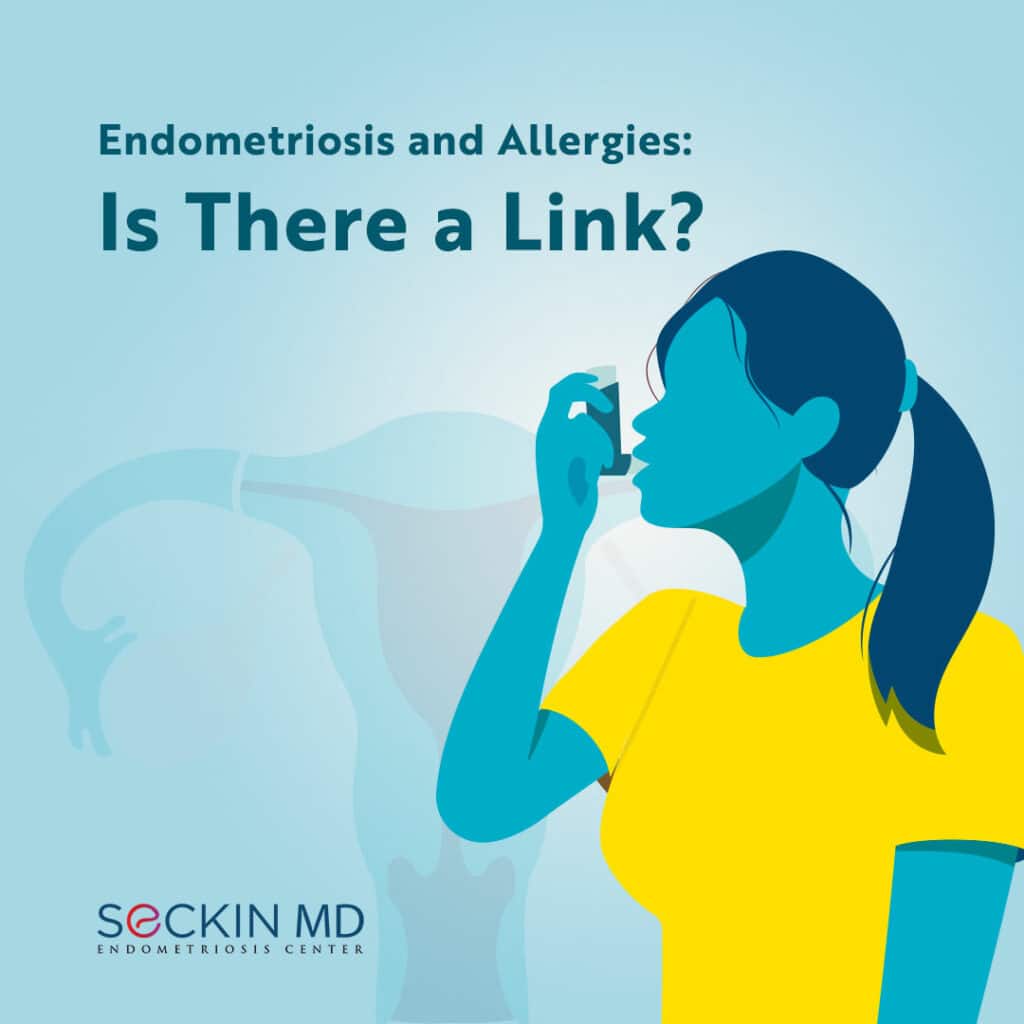Endometriosis and Allergies: Is There a Link?

An allergy is the immune system’s reaction to certain substances in the environment that are otherwise harmless. For example, your body may react to substances such as pollen, dust, certain foods, pet dander, insect stings, and certain medications. But is there a link between endometriosis and allergies?
What causes allergies?
Allergies are often the result of an overreactive immune system. They are characterized by the excessive production of immunoglobulin E (IgE).
Allergies can manifest as a rash, runny nose, watery eyes, and swelling. Most allergic reactions are temporary and subside with the removal of the irritant. But some can lead to anaphylaxis — a potentially life-threatening allergic reaction.
How does the immune system influence endometriosis?
Endometriosis is a multi-factorial disease in which genetics, hormones, the environment, and immune factors are in interplay. The exact way in which endometriosis develops is not fully clear. However, the immune system and its inflammatory pathways may play a role.
Endometriosis lesions exhibit a high degree of inflammatory substances. Various immune cell types such as neutrophils, macrophages, natural killer (NK) cells, and dendritic cells all contribute to the development and progression of endometriosis. Changes in the inflammatory balance also lead to increased cell proliferation, formation of new blood vessels, and adhesions.
These also change the nature of the lining of the uterus. This can make it a more hostile place for a fertilized egg to implant. This may be one of the factors causing infertility in women with endometriosis.
Is endometriosis an autoimmune condition?
An autoimmune condition occurs when the body’s immune system cannot differentiate between self and non-self. This results in the immune system mistakenly identifying the body’s own natural cells as foreign and attacking them. Common autoimmune diseases include rheumatoid arthritis, psoriasis, systemic lupus erythematosus (SLE), thyroid diseases, Sjögren’s syndrome, and type 1 diabetes.
Due to the nature of the immune system involvement, some view endometriosis as an autoimmune condition. Though there is no conclusive evidence for this, several studies have established the presence of endometriosis together with other autoimmune conditions. One explanation for this is that NK cells that normally help eliminate autoantigens are reduced in endometriosis. This could be the reason why many endometriosis patients also develop autoimmune disorders.
What is the association between endometriosis and allergies or autoimmune disorders?
Several studies have tried to define the association of endometriosis with allergies or autoimmune disorders.
For example, a 2002 study of 39 patients with laparoscopically confirmed pelvic endometriosis sought to determine the association between endometriosis, SLE, and other musculoskeletal conditions such as fibromyalgia. The study did find a possible link between endometriosis and fibromyalgia. However, there was no conclusive evidence for an association with SLE.
A survey of 3,680 endometriosis patients in the U.S. published in 2002 found that 61% of endometriosis patients had allergies. Allergy symptoms were also reported in 72% of endometriosis patients with endocrine diseases and in 88% of those with fibromyalgia and/or chronic fatigue syndrome. Conditions such as asthma, allergies, and eczema also occurred in a higher number of respondents with endometriosis and autoimmune disorders. The study again highlighted that women suffering from chronic pelvic pain often do not get a confirmed endometriosis diagnosis for many years.
A 2012 study that evaluated 501 women with laparoscopically diagnosed endometriosis showed that a high number of them had a positive history of allergies. Common allergic factors in the study included medications, allergic rhinitis, and asthma.
A 2014 systematic review also showed a similar link between endometriosis and allergies, particularly with regard to the prevalence of asthma in these patients apart from hay fever, allergic rhinitis, and food allergies.
On the other hand, a 2022 study with 501 patients showed that asthma was more prevalent in patients without endometriosis. However, these patients presented with allergy symptoms much earlier than the healthy controls. They also noted a statically significant correlation with endometriosis and the consumption of beef, alcohol, and soy products.
What can be done to minimize the allergic effects of endometriosis?
While studies are yet to fully define the link between endometriosis and our immune system, there may be certain measures to minimize the risk of allergies and endometriosis flaring up. For instance, switching to an anti-inflammatory diet and avoiding individual allergic triggers could help.
Laparoscopic deep excision surgery remains crucial for the diagnosis and treatment of endometriosis.
Do you suffer from endometriosis and allergies? Please do not hesitate to share your story by leaving a comment on our post on Facebook or Instagram.
Get a Second Opinion
Our endometriosis specialists are dedicated to providing patients with expert care. Whether you have been diagnosed or are looking to find a doctor, they are ready to help.Our office is located on 872 Fifth Avenue New York, NY 10065.
You may call us at (646) 960-3080 or have your case reviewed by clicking here.